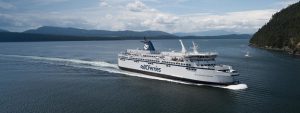
VICTORIA – As BC Ferries wraps up another busy summer season, focus now shifts to preparations for annual repairs, refits, and vessel maintenance.
The fall refit season unofficially began this week with repairs on the 60-year-old Queen of New Westminster. Divers have identified that one of the vessel’s propellers sheared off from its propulsion shaft. The propeller has been located and planning is underway for its recovery. Repairs will require the vessel to be in dry dock, for which space has been secured later this month.
As a result, all sailings for the Queen of New Westminster have been cancelled through September 30th. Should the repair schedule change for any reason, the sailing schedule will be updated and passengers will be notified.
In October and November, seven more vessels are expected to enter their regular refit process, including the almost 50-year-old Queens of Alberni, Coquitlam and Cowichan. All three of these vessels, as well as the Queen of New Westminster, are among those set to be retired in the coming years when new major vessels arrive.
BC Ferries remains focused on ensuring its fleet meets all safety and regulatory standards. Every vessel undergoes a rigorous refit process to ensure that Transport Canada’s stringent Safety Inspection Certificate requirements continue to be met.
This refit season is a vital part of BC Ferries’ ongoing commitment to safety, service, and fleet modernization. The company’s priority continues to be on fleet reliability and investing in the future through its long-term vessel renewal strategy.
This summer is on track to be the busiest in BC Ferries’ 64-year history, with continued growth across all routes. In June and July alone, over five million passengers and two million vehicles travelled on the ferry network. To meet this demand, refit schedules were optimized to ensure that all vessels would be in service for the summer season, nearly 600 new employees were hired, and extra sailings were added on the most popular routes to improve service delivery. Preliminary August reporting indicates that these adjustments have led to a smoother season than in previous years.
However, the challenges posed by the age of the fleet persist, which isn’t unexpected considering how long the six oldest vessels in the fleet have been in service. While operational hurdles remain, the focus remains on minimizing customer impact and maintaining open communication with passengers, while strategically planning for future demand.
BC Ferries recognizes that as vessels age, mechanical issues become more frequent. While the organization works hard to maintain and repair these ships, long-term solutions are necessary. BC Ferries is implementing a comprehensive vessel renewal strategy, including the introduction of new major vessels and the planned expansion of the size of the fleet, adding one net new vessel to service the major routes.
These new ships will increase capacity on the busiest routes, improving operational flexibility and reducing future disruptions. With the ability to carry up to 360 vehicles and 2,100 passengers, the new major vessels will better meet the growing demand on the busiest routes and ensure reliable service for years to come.
A Request for Proposals (RFP) for the new vessels will be posted soon, marking a significant milestone in BC Ferries’ largest-ever capital project aimed at modernizing the fleet and transforming ferry operations in British Columbia.
Source: BC Ferries


